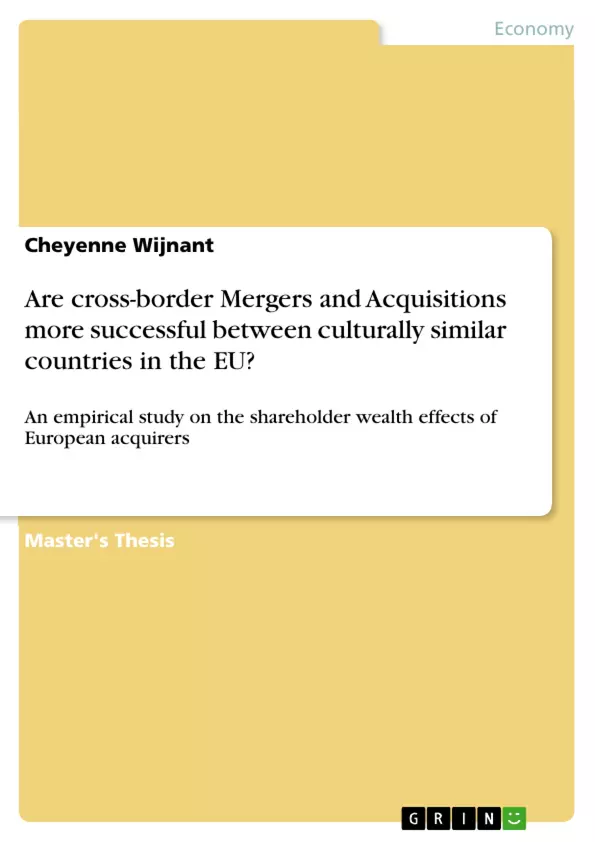Cross-border mergers and acquisitions have increased significantly over the last two decades and have substantially changed the European industry, since it has become one of the leading approaches for firms to gain access to global markets. However, there has been little progress in the research literature investigating the role of culture in explaining the success of these cross-border transactions. This paper analyzes if cross-border M&As are more valuable for acquirers between culturally similar countries by investigating the countries’ cultural distance, legal origin, trust, Hofstede’s dimensions, and corporate governance measures. The results indicate that cultural distance has a positive and negative effect on bidder announcement returns. Legal origin has a negative effect on acquirer gains in cross-border M&A whereas trust has a positive but insignificant effect. Hofstede’s dimensions have no particular effect on the data set and corporate governance measures have a strong negative effect on bidder announcement returns. The robustness checks do not alter the results.
Table of Contents
- ABSTRACT
- PREFACE
- TABLE OF CONTENTS
- INTRODUCTION
- BACKGROUND AND PROBLEM STATEMENT
- AIM OF THIS RESEARCH
- CONTRIBUTION TO PREVIOUS STUDIES
- STRUCTURE
- THEORETICAL FRAMEWORK
- CROSS-BORDER MERGERS & ACQUISITIONS
- Introduction to Mergers and Acquisitions
- Cross-border Mergers & Acquisitions
- Motives for cross-border M&A
- BARRIERS FOR European TraNSACTIONS
- Legal and regulatory barriers
- Cultural and political barriers
- Corporate governance barrier
- Other barriers
- MEASURES OF CULTURAL DIFFERENCES
- Cultural distance
- Legal origin measures
- Trust measures
- Hofstede measures
- Corporate Governance
- CROSS-BORDER M&A IN EUROPE
- PRIOR EVIDENCE ON CULTURAL DIFFERENCES IN CROSS-BORDER M&A
- CROSS-BORDER MERGERS & ACQUISITIONS
- RESEARCH DESIGN
- HYPOTHESIS DEVELOPMENT
- THE SAMPLE
- METHODOLOGY
- Abnormal returns
- Cumulative abnormal returns
- Test Statistic
- EXPLANATORY VARIABLES
- Dependent Variable
- Independent variables
- Control Variables
- SUMMARY STATISTICS
- EVENT STUDY
- Short-term analysis
- CARS in event studies
- OLS REGRESSION ANALYSIS
- The effect of cultural distance on announcement returns
- The effect of legal origin on announcement returns
- The effect of trust on announcement returns
- The effect of Hofstede's dimensions on announcement returns
- The effect of corporate governance on announcement returns
- Robustness tests
- EMPIRICAL RESULTS
- OLS REGRESSIONS OF CULTURAL DIFFERENCES OF ACQUIRERS
- Cultural distance
- Legal origin
- Trust
- Hofstede's dimensions
- Corporate governance
- ROBUSTNESS TESTS
- Hofstede's four versus 6 cultural dimensions
- Additional event windows
- OLS REGRESSIONS OF CULTURAL DIFFERENCES OF ACQUIRERS
- CONCLUSION AND LIMITATIONS
- CONCLUSION
- LIMITATIONS AND FUTURE RESEARCH
- BIBLIOGRAPHY
- APPENDIX
Objectives and Key Themes
This dissertation aims to investigate the relationship between cultural differences and the success of cross-border mergers and acquisitions (M&As) in the European Union (EU). Specifically, it examines the impact of cultural distance, legal origin, trust, Hofstede's cultural dimensions, and corporate governance on the shareholder wealth effects of European acquirers.
- The role of culture in cross-border M&A success
- The impact of cultural distance on acquirer returns
- The influence of legal origin, trust, and corporate governance on M&A outcomes
- An analysis of Hofstede's cultural dimensions in relation to cross-border M&A
- The application of an event study methodology to analyze shareholder wealth effects
Chapter Summaries
The dissertation begins by providing a comprehensive introduction to the topic of cross-border M&As, outlining their significance in the European context and highlighting the increasing need for research on the role of culture in these transactions. Chapter 2 delves into the theoretical framework, examining the motives for cross-border M&A and the various barriers that can hinder their success. It also explores different measures of cultural differences, including cultural distance, legal origin, trust, Hofstede's dimensions, and corporate governance. Chapter 3 details the research design, including the development of hypotheses, the selection of a sample, and the methodology employed. The chapter also discusses the explanatory variables used in the analysis, focusing on dependent, independent, and control variables. Chapter 4 presents the empirical results of the study, analyzing the impact of various cultural differences on acquirer announcement returns. The chapter further examines the robustness of these findings through additional analyses.
Keywords
The dissertation focuses on the key topics of cross-border mergers and acquisitions, cultural differences, shareholder wealth effects, European Union, cultural distance, legal origin, trust, Hofstede's cultural dimensions, corporate governance, and event study methodology. The research explores the relationship between these concepts and their implications for the success of cross-border M&As in the European market.
Frequently Asked Questions
Does cultural similarity improve M&A success?
The research indicates mixed results; cultural distance can have both positive and negative effects on bidder announcement returns depending on other factors like trust and governance.
What are Hofstede's dimensions in this context?
Hofstede's dimensions are metrics used to compare national cultures, such as power distance or individualism, though this study found they had no particular effect on the specific data set.
How does corporate governance affect cross-border M&A?
The study found that strong corporate governance measures often have a significant negative effect on bidder announcement returns in the European context.
What role does trust play in international acquisitions?
Trust has a positive effect on the success of M&As, although the research noted that this effect was not statistically significant in all cases.
Why are cross-border M&As increasing in the EU?
They have become a leading approach for firms to gain access to global markets and scale within the European industry over the last two decades.
- Arbeit zitieren
- Cheyenne Wijnant (Autor:in), 2017, Are cross-border Mergers and Acquisitions more successful between culturally similar countries in the EU?, München, GRIN Verlag, https://www.grin.com/document/376711



